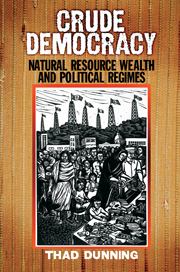Crossref Citations
This Book has been
cited by the following publications. This list is generated based on data provided by Crossref.
Richardson, Neal P.
2009.
Export-Oriented Populism: Commodities and Coalitions in Argentina.
Studies in Comparative International Development,
Vol. 44,
Issue. 3,
Morrison, Kevin M.
2009.
Oil, Nontax Revenue, and the Redistributional Foundations of Regime Stability.
International Organization,
Vol. 63,
Issue. 1,
p.
107.
Peters, Anne Mariel
and
Moore, Pete W.
2009.
Beyond Boom and Bust: External Rents, Durable Authoritarianism, and Institutional Adaptation in the Hashemite Kingdom of Jordan.
Studies in Comparative International Development,
Vol. 44,
Issue. 3,
p.
256.
Kurtz, Marcus J.
2009.
The Social Foundations of Institutional Order: Reconsidering War and the “Resource Curse” in Third World State Building.
Politics & Society,
Vol. 37,
Issue. 4,
p.
479.
Le Billon, Philippe
and
Cervantes, Alejandro
2009.
Oil Prices, Scarcity, and Geographies of War.
Annals of the Association of American Geographers,
Vol. 99,
Issue. 5,
p.
836.
Norris, Pippa
2009.
Petroleum Patriarchy? A Response to Ross.
Politics & Gender,
Vol. 5,
Issue. 4,
p.
553.
Colgan, Jeff D.
2010.
Oil and Revolutionary Governments: Fuel for International Conflict.
International Organization,
Vol. 64,
Issue. 4,
p.
661.
2010.
Who Can Stop the Drums?.
p.
257.
2010.
Who Can Stop the Drums?.
p.
64.
Gerring, John
2010.
Causal Mechanisms: Yes, But….
Comparative Political Studies,
Vol. 43,
Issue. 11,
p.
1499.
2010.
Who Can Stop the Drums?.
p.
1.
2010.
Who Can Stop the Drums?.
p.
87.
Marquart-Pyatt, Sandra T.
2010.
Environmental Sustainability.
International Journal of Sociology,
Vol. 40,
Issue. 2,
p.
65.
2010.
Who Can Stop the Drums?.
p.
267.
2010.
Who Can Stop the Drums?.
p.
160.
Acosta, Andrés
2010.
Annex 4: Natural Resource Governance – Review of Impact and Effectiveness of Transparency and Accountability Initiatives.
SSRN Electronic Journal,
Barkin, David
and
Dayton Gunn, Hazel
2010.
Books Received.
Review of Radical Political Economics,
Vol. 42,
Issue. 1,
p.
121.
Dunning, Thad
2010.
Endogenous Oil Rents.
Comparative Political Studies,
Vol. 43,
Issue. 3,
p.
379.
2010.
Who Can Stop the Drums?.
p.
212.
TSUI, KEVIN K.
2010.
RESOURCE CURSE, POLITICAL ENTRY, AND DEADWEIGHT COSTS.
Economics & Politics,
Vol. 22,
Issue. 3,
p.
471.



